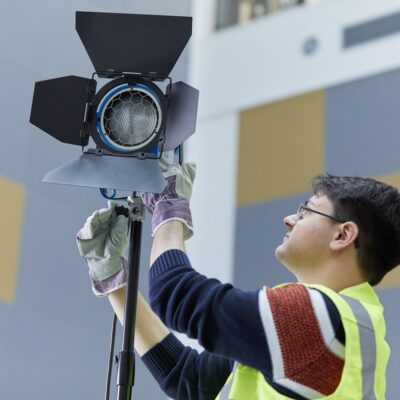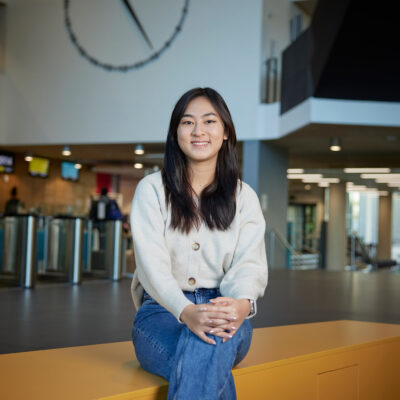
John Hunt
Senior Lecturer in Photography
Faculty of Arts, Science and Technology
DiscoverUCAS Code
BA: W640
BA with Foundation: W642
Level
Undergraduate
Duration
Full Time: 3 years
Full Time Foundation: 4 years
Part Time: 4 - 6 years
Starting
September
BCC at A-Level or,
DMM at BTEC or
a Foundation Diploma in Art and Design
Fees UK 24/25
Full Time: £9,250
Part Time: £1,540 (per 20 credits)
Integrated Foundation Year: £9,250
Fees International 24/25
Full Time: £15,200
Integrated Foundation Year: £15,200
Location
For questions regarding study and admissions please contact us:
study@northampton.ac.uk
0300 303 2772
Our Photography BA degree takes a practical approach to exploring the photograph within a range of contemporary practices and contexts. This will extend to a critical understanding of photography subjects and allows the scope for you to develop your creativity and professionalism.
During our undergraduate photography course, we will challenge you to consider traditional silver processes and digital technologies, evaluating photographic production and studying the still image in relation to both the moving image and newer interactive technologies.
Students studying BA Photography at the University of Northampton will also benefit from our industry standard photography studio facilities, which you can explore via the virtual tours below.
Updated 18/04/2024






On our Photography BA (Hons) programme, you will develop your understanding of contemporary photographic and video work within a diverse set of visual art, commercial and fashion contexts, to understand the impact that still and moving images can have and the change they can inspire. We encourage you to explore the photograph and moving image within art, editorial, product, fashion, and entertainment industries. You will develop skills independently, so that you can work to client and exhibition commissions and function as a professional following graduation in photography.
We also organise annual trips for groups of around 30 students across the arts subjects. These are optional but have proved to be valuable for students’ academic and practical experience.
Want to see some our of students’ work? Follow the University of Northampton’s BA Photography course on Instagram – @uon_photography.
All BA Photography students are encouraged to attend exhibition trips that are organized throughout the year. We usually cover the cost of journeys by coach, but you will be expected to pay for any additional journeys by rail. The cost will depend on how far in advance you book tickets, whether you use a student rail card or if underground travel is required. Some of the bigger exhibitions at established institutions will charge an entry fee, which will be reduced if you show your student card.
As well as your assessed coursework, we encourage you to present your work to the public. There will be additional costs included in contributing to and setting up exhibitions, such as gallery hire, printing, mounting/framing and transport. These will vary depending on the venue and the number of participants.
On the degree in Photography, you will have the opportunity to do photography work experience, either paid and unpaid, alongside your studies. Recently, students have had internships and work-based learning with Northampton Council, NN Gallery, FrasierShot, Actium, Macmillan Cancer Charity and The Guardian.
Please note the modules shown here relate to the academic year 23/24. The modules relating to the academic year 24/25 will be available from June 2024.
This Photography degree has been designed to contribute towards achieving the following United Nations Sustainable Development Goals:
A typical offer for Photography would be:
We welcome applications from students with a mix of A levels and BTEC/Cambridge Technical qualifications.
Applicants for our undergraduate photography degree are requested to send in a digital portfolio of their own work in Art and Design, which will then be reviewed by the University Photography team. Receiving an offer may also be subject to qualifications and standard entry requirements.
International students may also submit their portfolio electronically. Students with a relevant HND or Foundation Degree with a suitable profile of achievement may be admitted onto year two or three.
For more information on how to make an application, please visit our How to Apply page.
If you are an International student and would like information on making an application, please see our How to Apply page.
Admission to this foundation photography programme is normally:
We welcome applications from students with a mix of A levels and BTEC/Cambridge Technical qualifications.
However, we would also like to hear from you if you have professional or industry experience instead, a range of other qualifications or self-developed subject knowledge that relates to the programme you wish to study.
Once your application has been reviewed, you may be invited to attend an interview with us.
Prior to your interview you will be asked to send in a digital portfolio, which should include 5-10 pieces of your work. Your portfolio should include examples of your visual research/journal work, and short piece of writing on photography or other lens-based mediums (essay, contextual report, exhibition review etc). This will give us some insight into how you write formally, and your familiarity with key texts. There is no minimum or maximum word count for this, and a piece of school/college coursework is fine. We’re looking to see your interests and ideas, as well as your photographic skills, experience, and working/research methods. You may also include a link to your website or Instagram page.
Your interview will be with a member of the programme team and you’ll go over your portfolio with them. They’ll ask you some questions around your work and your interest in the course. This is also a great opportunity for you to ask them any questions you may have about the course.
We hold our Photography interviews online and it will take around 30 minutes.
All International and EU students applying for a course with us must meet the following minimum English language requirements:
For information regarding English language requirements at the University, please see our IELTS page.
Fees quoted relate to study in the Academic Year 24/25 only and may be subject to inflationary increases in future years.
Fees quoted relate to study in the Academic Year 23/24 only and may be subject to inflationary increases in future years.
Study Trips Abroad
We organise annual international trips for groups of around 30 students across the arts subjects. These are optional but have proved to be valuable for students’ academic and practical experience.
There are usually one or two trips to Europe each year and at least one long haul trip further afield. Study trips to Europe cost approximately £400-450 while trips to America/Asia cost approximately £1000-1200.
Additional costs to be considered (prices can vary):
For more information please see the What you will need section.
For information on the scholarships available to you, please see our scholarships page.
For more information about possible funding options, please visit our Fees and Funding pages.
At the University of Northampton, everything we do, from funded trips to paid internships, is to give you everything you need to make a difference when you leave.
If you join this full time Photography degree at the University of Northampton, you will receive a laptop when your course begins*. The laptops are built to a bespoke custom specification ideal for use in the seminar room, collaborative group work or studying at home.
Whatever your ambitions, we’re here to help you to achieve them. We’ll support you to identify the skills you’re learning during your course, find your strengths and secure practical experience so that when it comes to applying for jobs or further study you’ll feel confident in standing out from the crowd. We’ve created the Northampton Employment Promise because we are so confident that if you focus on your studies and complete one of our awards you’ll be highly employable by the time you graduate. Putting you in a great position to secure employment or continue your studies.
To check out the full list of perks, visit our Student Perks page or dedicated International Perks page.
*UK fee payers only (see Terms and Conditions for further details).
The Integrated Foundation Year (IFY) offers a new and exciting route into studying for a Photography degree, attracting ambitious and driven students who are willing to learn and advance.
If you have non-standard qualifications or do not quite meet the admissions requirements we can offer you a fantastic opportunity to study a four year programme which includes an Integrated Foundation Year. The Integrated Foundation Year will help you develop the theoretical/practical and academic skills you need, in order to successfully progress to the full award.
Our four-year courses will enable you to successfully follow the degree pathway of your choice while gaining essential study skills. The foundation year of your chosen degree will be studied on a full-time basis and is aimed at supporting the transition to higher education. Years two, three and four are then studied as a standard degree programme.
By studying photography at university, you will build and develop your skills, creativity and technical abilities – which are essential elements to success. You will also have the benefit of accessing our studio facilities, building a portfolio, and participating in external exhibitions to prepare you for your professional career.
We take a range of approaches to teaching throughout our photography degree, including lectures, seminars, practical workshops, individual tutorials and group critiques, to facilitate critical discussion and analysis.
Theory is assessed through essays, a contextual report and presentations. Practical work is judged through portfolio presentations and exhibitions, and aligned with individual module criteria.
In the summer before you start studying with the University of Northampton, you will be sent a list of necessities for the course, with recommendations of where to buy the products at a reasonable price. These include external hard drives, SD cards, portfolio boxes, sketchbooks, stationery etc., costing a total of approximately £100-150.
We have our own Art shop on the Waterside campus, where you will be able to purchase many of these items.
While students are not expected to arrive with their own high-end cameras, many students do choose to buy their own DSLR by the end of their Level 5 (Stage 2/second year). A range of photography equipment is available to loan, subject to availability. Please be aware that our stocks of digital cameras are Nikon and we have a range of lenses that will fit this make. We also have some Canon lenses to hire. Our equipment can be loaned for longer periods – for example over the summer vacation. However, we do ask that it’s insured for this purpose.
N.B. There is no cost to hire kit, and costs for this insurance are quite reasonable.
For independent work off-campus, you may need to provide your own hardware equipment such as laptops (not if you take up the free laptop offer) or MacBooks and printers. Digital imaging software such as Photoshop, Premiere Pro or Final Cut Pro or Adobe Creative Cloud is provided for all Photography students on and off campus.
On campus, there are digital workstations (Mac and PC) available for you to use as well as a networked top-up card printing facility (including colour) that you would pay per print for. There is also 24-hour Mac Suite access for those studying BA Photography should you need it after hours.
You can choose to shoot on film (35mm, medium or large format) or other media such as polaroid. However you’ll need to purchase your own film unless it is part of a Level 4 (First year or Stage One) workshop. Black and white film processing and dish tray printing facilities are available for you to use free of charge. In the first year of your photography degree, you will be given two rolls of 35mm b/w film and one roll of colour film for their technical workshops.
Other costs on the Photography course may involve the production of a self-published book as part of a portfolio, project or exhibition and is usually produced and ordered through an online company.
Some projects will make use of screen-based images or projections, with no additional cost, however you will be required to print your photographs from other projects which will incur a cost. This will be dependent on scale, paper type and so on. We have an in-house printing and mounting service, offering reasonable prices for print orders. Alternatively, you can use professional labs for high-quality exhibition prints and finishing. For exhibition-based modules (in stage two and three), there are additional costs to consider regarding the display & presentation of work such as print mounting and framing. You will be able to use our scanner for colour film and our black and white darkroom facilities to dish tray print B&W film-based images, but you will need to provide your own paper, unless the printing is part of a taught workshop.
Every year, our Photography students take part in Changing Futures Week, which is aimed at showcasing industry careers and opportunities. The week includes masterclasses, key-note speakers, demonstrations and specialist events. This year, our Photography students took part in an ‘Industry Day’, which included a professional photoshoot!
Associate Lecturer (Photography)
Faculty of Arts, Science and Technology
DiscoverSenior Lecturer in Photography
Faculty of Arts, Science and Technology
DiscoverSenior Lecturer in Photography
Faculty of Arts, Science and Technology
DiscoverOur Photography degree is excellent preparation for a range of careers in fields such as the commercial and public sectors, marketing, public relations and specialised fields.
With the skills and knowledge developed on our photography undergraduate programme, our graduates have gone on to pursue a wide variety of different photography careers. Opportunities in the field of photography include, but are not limited to;
You could develop your practice as an independent artist and pursue collaborations, commissions, publication and exhibition opportunities. You would also be well positioned for master’s study.
Our master’s courses are a great way to enhance the skills you have already learnt. Benefit from our 20% alumni discount on master’s courses to give yourself a CV that will catch the eye of employers.
While studying for a photography degree at UON, you can make use of the top facilities available, such as our black and white darkroom in line with industry standards. Two large studios (one with daylight, and the other with artificial lighting) provide professional standard facilities for a wide range of studio-based photography using film or digital cameras.
There is a digital Mac suite, which is a dedicated digital photography training room. You will have access to a range of film and flatbed scanners (including the Hasselblad Flextight Scanner), and fully colour managed computers which are linked to the digital print room. You will also have access to a video editing suite, with industry standard software.
An in-house exhibition-standard printing and mounting service is also available.

Our Photography Top-Up takes a practical approach to exploring the photograph within a range of contemporary practices and contexts. Apply now.

A practical and multi-disciplinary industry-led degree to prepare you for exciting careers in the rapidly evolving fashion sector.

